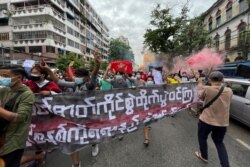Myanmar’s post-coup ruling State Administration Council has, since the last week of February, been arresting family members of dissidents in an effort to pressure the dissidents to turn themselves in, according to dissidents, lawyers helping those charged, and an official of the opposition National Unity Government.
Family members of activists, politicians, and officials involved in the Civil Disobedience Movement, they say, have been arrested and imprisoned by SAC. Some, they say, were beaten and tortured by security forces for failing to provide information about dissidents who have evaded arrest.
"Arresting innocent family members is a coercive act. We strongly condemn this,” Aung Myo Min, the NUG’s human rights minister, who has spent three decades defending human rights, told VOA June 30.
VOA made repeated attempts to get a comment from the SAC for this report but was unable to do so.
SAC security forces began arresting dissidents’ family members during the last week of February, according to the Thailand-based Assistance Association for Political Prisoners. While there were only a few cases in February and March, according to the AAPP, more than 30 family members were arrested in April.
The AAPP said that as of June 22, at least 85 family members of dissidents have been arrested since the Feb. 1 coup in Myanmar, with 29 released and 53 still in custody. The total includes 41 girls or women ages 2 to 75 years old.
Tin Htut Paing, a well-known activist in Yangon’s working-class North Okkalapa township told VOA June 23 that his mother, Mi Ngal, both of whose sons are activists, was beaten and arrested by SAC forces May 2.
According to Tin Htut Paing, who has been evading arrest and is in hiding, he heard from his father that his mother had been sentenced to three years’ imprisonment under the country’s legal code.
“Although my mother had not committed any crime, was sentenced by the military court to a maximum sentence,” he said.
“As North Okkalapa township is under military rule, no appeal can be lodged of the sentence handed down by the military court,” he said.
“Imprisoning my innocent mother was a manifestation of the atrocities of the military,” Tin Htut Paing added.
Another activist, Zarni Kyaw, told VOA three of his family members had been arrested because of his actions.
Zarni Kyaw, 41, a protest leader, left his township in central Myanmar after an arrest warrant was issued for him. Three weeks later, soldiers came to his home and arrested his 80-year-old father, 49-year-old sister and 60-year-old uncle, he told VOA.
“My dad is a retired military personnel and had served for Tatmadaw [the Myanmar military] for many years. But they don’t care and appreciate his service,” said Zarni Kyaw, who is now training with opposition Karen National Union forces.
The whereabouts of family members arrested by the military council are not easy to find out. They were not sent directly to prison, but some were detained in military-owned buildings, and some faced lengthy interrogations at the detention centers, activists and lawyers say. In some cases, other family members did not know where the detainees were being held until they were sent to prison after days of harsh interrogations, according to lawyer Zarli Aye.
"Some of them were detained for more than a month during interrogation and then were sent to prison," said Zarli Aye, a member of a “Lawyers for You” team formed in early March to provide free assistance for those arrested.
"When we met with them [arrested family members] in prison, I was told they were forced to call the fugitives to persuade them to come back. Soldiers used various methods against the prisoners when they failed to follow what soldiers asked,” she said. She said some were beaten and denied food and water for a period of days, and a young girl was threatened with rape.
The lawyers’ group is assisting 20 arrested activists’ family members being held in Yangon’s Insein Prison, but no one has been convicted yet. All cases are being heard in special courts inside the prison, Zarli Aye said.
While the law does not allow anyone to be held for more than 24 hours, since the coup, many people, including activists’ relatives, have been detained illegally for several days with no reason given. Zarli Aye also said these prisoners are not receiving a fair trial after they have been charged.
"They have been subjected to human rights abuses since before the trial. They were detained for several days without remand. They are not allowed to see family members and to receive food from outside, even after being sent to prison. Also judges impose restrictions on us during the court hearings. My questions to police officers who filed complaints in the case were rejected by judges very often," Zarli Aye said.
The SAC’s arrests of fugitives’ family members do not seem to be succeeding; activists feel sorry for those arrested but remain determined to continue their fight.
Zarni Kyaw understands his three family members would be released if he surrendered for arrest but still plans to join the Karen National Liberation Army, the military branch of the KNU.
“Joining the KNU and fighting with them is the best way to overthrow the military regime. I hope my father would agree with my decision,” he told VOA.
Tin Htut Paing, the activist whose mother was arrested, has made a similar decision, saying that he expects the opposition to win and on that day, “those unjustly detained with my mother will be released.”






